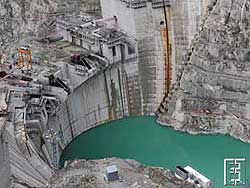MEDIA
 The view from the Swiss hotel where I found myself this winter was wet indeed. Both the falling rain and the sight of Lake Leman a few meters away focused attention on the theme of the meeting that brought me there: water.
The view from the Swiss hotel where I found myself this winter was wet indeed. Both the falling rain and the sight of Lake Leman a few meters away focused attention on the theme of the meeting that brought me there: water.
Invited by the Strategic Foresight Group of Mumbai, India, to take part in their initiative on water security in the Middle East, I attended two workshops convened in February in Montreux: the first on Lebanon, Syria, Iraq and Turkey, and the second on the Jordan Valley countries. Supported by the Swiss and Swedish governments, the aim was to find sustainable collaborative solutions to the problem of water security, by using water as an instrument of regional peace.
Delivering the event�€™s keynote speech, Prince Hassan bin Talal of Jordan stressed the need for a regional water community. He called for a supra-national entity, such as the coal and steel community out of which the European Economic Community grew. He voiced hope that such a concept could spur regional co-operation and bring benefits comparable to European integration. Extending the metaphor that water does not start fires but puts them out, he noted that �€œwar does not make additional water, but regional cooperation can.�€
Looking at the Iraq-Syria-Turkey triangle in particular, it is possible to see this idea becoming a practical proposition. After centuries of Ottoman occupation of Syria and Iraq, followed by decades of friction among the three countries, each of them has now reached a stage of economic development where sustainable mechanisms to make the best use of shared water look both crucial and inevitable. Of the three, Syria may have the weakest resource position, with Turkish water and Iraqi oil respectively making Ankara and Baghdad look better endowed than Damascus. Syria shares five rivers with neighboring countries: the Euphrates, Tigris, Yarmouk, Orontes, and Al Kabir Al Janoubi. Of these, the Euphrates is most important for Syria, providing 36 percent of its renewable annual surface water resources. Multiple dams being constructed upstream in Turkey could potentially cut off some supply downstream, but better political relations on the one hand and sound use of water all around on the other should help ameliorate the problem. An agreement was signed in 1986 to allocate water from the Euphrates among Turkey, Iraq and Syria. A more recent accord among the three allows Syria to irrigate 150,000 hectares of land from the Tigris.
It may, however, be a good idea to put these agreements in the framework of a Tigris-Euphrates basin authority, which would have the power to develop hydraulic resources. Such a body could be financed by international donors, as well as Iraq and Turkey, with its headquarters in Syria. The authority would seek to make development of the basin a dynamic process backed by research, follow-up and the muscle to take decisions regarding water use.
Is this a utopian idea? Not at all: the three countries have been steadily moving closer over the past few years and such a step is no longer far-fetched (It�€™s true that there was a spike in tension between Syria and Iraq over accusations of recent bombings in Baghdad and other security issues, but that is gradually fading).
For the sake of the whole region, this would be a good idea, but Syria in particular could benefit greatly. The country�€™s per capita available water resources are about 860 cubic meters per year, below the international water poverty standard of 1000 cubic meters per capita annually. Regional modeling studies forecast a reduction of rainfall in the mid-21st century in the upper Euphrates and Tigris basin, leading to a drop in river discharge of 10 to 25 percent by 2070. Meanwhile, water shortage is increasing. Some 60 percent of the country�€™s irrigated area is served by private wells, over half of which are illegal �€“ more than double the illicit drilling rate of 25 percent in 1999.
In short, Syria is suffering from water tension, which could be relieved by comprehensive management of Tigris-Euphrates resources. That in turn would have a positive domino effect on Syria�€™s water sharing with Lebanon and Jordan, also contributing to decreased tension.
Riad al-Khouri is a senior economist at the William Davidson Institute of the University of Michigan in Ann Arbor, and dean of the business school at the Lebanese French University in Erbil





